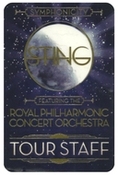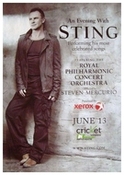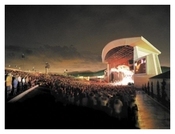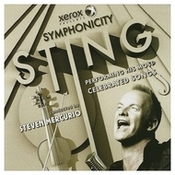
Symphonicity
Sting's music has taken so many transformational detours in the years since he first left the Police in the mid-'80s - his albums have encompassed everything from jazz-pop and urban-soul to, more recently, revamped Christmas madrigals and the love songs of16th century writer John Dowland - that it's almost surprising he hadn't attempted anything like his current 'Symphonicities' tour until now.
Certainly he's worked with strings and brass in the past, even been backed by an orchestra for the occasional one-off appearance. But this international outing - which arrived Sunday in Southern California, playing to a merely half-full Cricket Wireless Amphitheatre in Chula Vista before moving on to the Hollywood Bowl on Tuesday and Verizon Wireless Amphitheater in Irvine on Wednesday - marks the first time Sting has attempted something so daunting (and a bit cliche) as a symphonic overhauling of a few dozen selections from his vast and varied catalog. (He played 25 of them down south.)
Naturally, such an undertaking has led to a companion album (due July 13) of studio takes boasting lushly dramatic and playfully re-energizing support from both the 45-member Royal Philharmonic Concert Orchestra (so named ''because I borrowed them from the Queen,'' he quipped here) and a team of first-rate arrangers (among them David Hartley, Rob Mathes and Michel Legrand).
Yet that further reflects a certain late-career shift (slowing?) in creative drive from the British rock icon. He has released nearly as many albums in the past decade as he did in the '90s or even his busier '80s, but only one title - 2003's middling 'Sacred Love' - was comprised of all-original material. An orchestral tour at this point, no matter how musically rich and lavishly detailed this one is, still smacks of lacking inspiration.
It also doesn't help that Sting's latest creation is emerging so soon after Peter Gabriel's similar (and superior) Scratch My Back show at the Hollywood Bowl a little more than a month ago.
Gabriel's radical yet rewarding program, which left virtually all traditional rock instrumentation behind and was enhanced by engulfing visuals that mattered as much as the music itself, has set a daring new standard for what can be achieved from such pop/classical hybrids. (Plus, it found him reworking not only many of his own classics but also a dozen songs from a generations-wide range of artists.)
Sting's admirable, at times highly enjoyable production, on the other hand, rests somewhere in the middle of the spectrum. It's hardly as mechanical or inorganic as most schlock symphonic stuff gets, whether from Streisand or Metallica - yet neither is it as fully realized and forward-thinking as Gabriel's advances.
Especially not visually, though this classy but static affair boasts a stage design by Bauhaus-influenced (the movement, not the band) artistic director Robert Molnar and features art-exhibit videos from a diverse roster of talent, including director Michel Gondry, Belgian artist Pierre Bismuth and Sting's second oldest daughter, Mickey Sumner. Yet the whole thing is swallowed up in burnished decor and lighting, with three overly gridded screens offering rendering many of the video segments fractured to the point of inessential.
That's why I say ''a bit cliched'': there were moments during Sting's two-sets-in-three-hours show Sunday night that felt very obvious, even if the playing and the selections themselves rarely were.
For every extreme makeover - the dark Prokofiev-ish fanfare Vince Mendoza applied to 'Russians', the Sondheim menace that made Nicola Tescari's creeping arrangement of 'Moon over Bourbon Street' something like a scene out of Nosferatu by way of Sweeney Todd - there were twice as many oh-of-course bits (adding Aaron Copeland elements to the Western tale ''I Hung My Head,'' for instance) or predictable arrangements that were either bland ('Fields of Gold', 'When We Dance') or just plain silly (the stomping rocker 'Next To You' is what should have been excised from the first set, Mr. Sumner, not 'Message in a Bottle', which was played in Vancouver).
Even remodeling 'Roxanne' as an understated Jobimesque bossa nova, its melody mostly sung in a lower register, seemed too façile an approach. Sting more successfully revisited prominent but oft-undervalued South American influences in his work in the second set, not just in the expected encore of 'Fragile' but notably by bringing a touch of superb sultry pathos to the obscure May-December portrait 'All Would Envy', a song dating back to 1999's 'Brand New Day' sessions that was issued only as part of the companion DVD 'Inside the Songs of Sacred Love'. Yet, compared to the evening's more knockout moments, going Brazilian with 'Roxanne' was as easy a choice as the red lighting that warmed the stage while the star strummed an acoustic guitar.
That was one of few times he picked up an instrument Sunday night, by the way, preferring instead to occasionally blow harmonica or tap a tambourine; he leaves the fretwork to guitarist Dominic Miller and double-bassist Ira Coleman, and gets vocal assists from Jo Lawry, who capably handles the Mary J. Blige role on 'Whenever I Say Your Name'. Sting's a naturally charismatic showman who remains instantly compelling behind a microphone - his voice, though in need of some warming up on this chilly night, is as robust and alluring as ever - yet there was still some awkwardness in seeing him strictly as a singer for such a lengthy stretch. He didn't always seem so at-ease during instrumental passages as he was telling stories between songs, and though he's never been one to overdo gestures, he nonetheless often resorted to stuffing his hands into the pockets of his trim mock-tuxedo outfit - perhaps out of not knowing what else to do with them?
What made this memorable entertainment, however - what makes it a show I'd heartily recommend to any Sting fan, although not to fence-sitters - is the unexpected and revelatory intimacy he has brought to this tour, as well as the deep setlist.
There are still plenty of hits, though he's understandably skimpy on Police remakes (he did just tour with them, after all). But the Big Ones this time out - 'If I Ever Lose My Faith In You', 'Every Breath You Take', 'Every Little Thing She Does Is Magic', 'King of Pain' - essentially bookend an excursion into his past that touches on virtually every album and dusts off several neglected gems.
Not just less-impacting hits, either, though 'Mad about You' (with heightened Arabesque flourishes) and 'Englishman in New York' (with more Benny Goodman in it, thanks to clarinetist Cerys Green, if I have her name correctly, seen above) both made welcome returns. (There's Sting having a spot of tea as the latter tune begins.) He also dug up cuts only longtime devotees would know, including lively versions of 'Straight to My Heart' (a ripping romantic winner from 1987's '...Nothing Like the Sun') and 'She's Too Good For Me' (a blitzing and bouncing flipside to that from 1993's 'Ten Summoner's Tales'). Also, I don't remember hearing 'Moon over Bourbon Street' since his first two solo tours (anyone?), which is about how long it's been since 'I Burn for You' was in the mix as well (though, my dumb luck, he left that one off in San Diego).
Most all of these selections were made even more engaging thanks to Sting's storytelling, whether recounting the frigid Cold War origins of 'Russians', his relationship with his father (the basis for 'Why Should I Cry For You?') or how the mystery that is songwriting can sometimes lead a famous 58-year-old heterosexual in an admittedly open marriage to pen a smoky, sympathetic ditty about a tranny in five-inch heels ('Tomorrow We'll See').
He was so candid - if also calculated; you'll likely hear the same stories at the Bowl and Verizon - that at times I found myself less interested in what swoops and blats the Royal Philharmonic (under the excitable direction of Steven Mercurio) might add next and instead started craving more chattering Sting insights. There's an even greater show buried amid all this symphonic grandeur, I think, one that further ties together fascinating facets of his life the way his 2008 autobiography Broken Music does. This one, when it really dares to peek, finds new wrinkles of meaning in his vocal delivery, plus a world of wondrous instrumental shades and sounds one hopes Sting explores further once he returns to writing a proper new album.
Too much of it, however, works only as artful nostalgia from a performer who nowadays seems less profound and more like he's running in place.
(c) The Orange County Register by Ben Wener
Sting orchestrates new/old musical moves for concert at Cricket Wireless
Amphitheatre...
Unlike Chuck Berry and The Beatles before him, Sting has not rolled over (or
under) Beethoven to tell Tchaikovsky the news.
But Sting, who performed at Cricket Wireless Amphitheatre in Chula Vista last
night, does have some pretty big news of his own. He is now embarked on the
first tour of his storied career with an orchestra, an ambitious undertaking
that is officially billed as: ''An Evening with Sting Performing his Most
Celebrated Songs, Featuring the Royal Philharmonic Concert Orchestra, Conducted
by Steven Mercurio, Presented by Xerox.''
Yes, it's a mouthful of a title, but Sting is no stranger to near-epic endeavors.
And his foray into the world of symphonic pop is both a bit of an artistic
stretch and a logical extension of a career that has seen the 58-year-old pop
superstar delve into more styles - from rock, reggae and jazz to country, tango,
lute-driven medieval music and more - than most of his contemporaries can dream
of successfully matching.
''I have the biggest band I've ever had behind me,'' Sting told the Cricket
audience, after opening yesterday's concert with his 1993 song, 'If I Ever Lose
My Faith In You' (minus the tricky rhythmic inversions of his original version).
''They're called the Royal Philharmonic,'' he said of the 45-piece orchestra,
''because I borrowed them from the queen.''
That line might have achieved more impact had it been followed by a snare drum
rim shot from one of the multiple percussionists on stage, but no matter. There
was indeed a regal flavor to the concert, which boasted lots of pomp and
circumstance in its less inspired moments and an impressive degree of craft and
invention at is best.
The 25-song performance featured at least 8 songs from Sting and the orchestra's
upcoming album, 'Symphonicities', which span his four-decade career without
sounding like a conventional retrospective. As promised, the concert mixed
well-sung versions some of his ''most celebrated'' numbers ('Roxanne', 'Every
Breath You Take' and the concert-concluding 'Fragile') with less obvious choices
('I Hung My Head', 'End of the Game' and 'All Would Envy').
While a greater dynamic range would have been welcome - too many of the
arrangements were pretty and pleasant, no more, no less - the most auspicious
pieces suggested this is a musical experiment that can pay rich dividends. At
least it can if Sting is willing to take more chances, so that he can challenge
and elevate his listeners, rather than merely lull them with lush mood music.
To do so will require adding more orchestrations that offer tension, release and
the very welcome sound of surprise. These qualities were abundantly present in
Sting's Cold War-inspired 1985 song 'Russians', which was newly arranged by ace
jazz veteran Vince Menodza with deft stylistic nods to such composers as
Prokofiev and Shostakovich. Equally rewarding was 'Moon over Bourbon Street',
arranged by Nicole Toscari with skittering string lines that suggested Varese at
his most playful, and 'She's Too Good For Me', whose arrangement by Rob Mathes
fused Vivaldi-inspired violin flurries with the song's patented rock-a-boogie
beat.
In too many other instances, such as 'Every Little Thing She Does Is Magic' and
'Tomorrow We'll See' (which were arranged by Mathes and David Hartley,
respectively) the orchestrations provided a sonic cushion so light and overly
sweet they seemed like the aural equivalent of cotton candy. Coupled with the
Philharmonic's often deferential playing - despite conductor Mercurio's overly
flamboyant gestures -- Sting had no one to act as a foil or to push him outside
of his comfort zone.
The orchestra was ably augmented by a five-piece group led by long-time Sting
guitarist Dominic Miller. Thanks to a superior sound mix, the 50-piece ensemble
could be heard with consistent clarity throughout Cricket. (The venue, which has
a capacity of nearly 20,000, was less than half full last night and the grassy
area at the rear, which alone can accommodate 10,000, was closed.)
What was missing, besides more fans for the steeply priced concert, was the edge
that has distinguished Sting's best music with The Police and in his solo
career. Also gone was the gray beard he sported when The Police's reunion tour
stopped at Cricket in 2008. Sting, no dummy he, may have wanted to avoid the
implication that orchestral music is the domain of men with gray beards, not
suave, clean-shaven rock stars with ever lofty aspirations.
(c) Copyright The San Diego Union-Tribune by George Varga
June 13, 2010
SET LIST
- If I Ever Lose My Faith In You
- Englishman In New York
- Every Little Thing She Does Is Magic
- Roxanne
- Straight To My Heart
- When We Dance
- Russians
- I Hung My Head
- Shape Of My Heart
- Why Should I Cry For You?
- Whenever I Say Your Name
- Fields Of Gold
- Next To You
- A Thousand Years
- Tomorrow We'll See
- Moon Over Bourbon Street
- End Of The Game
- You Will Be My Ain True Love
- All Would Envy
- Mad About You
- King Of Pain
- Every Breath You Take
- Desert Rose
- She's Too Good For Me
- Fragile
- I Was Brought To My Senses





